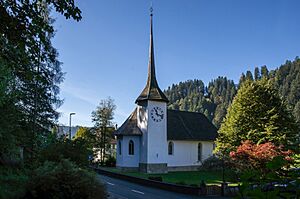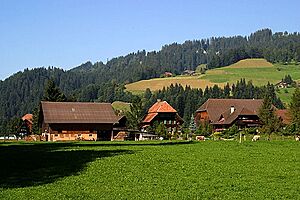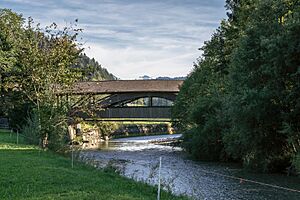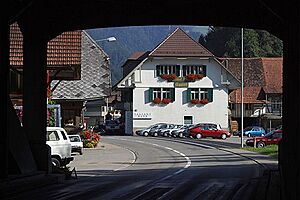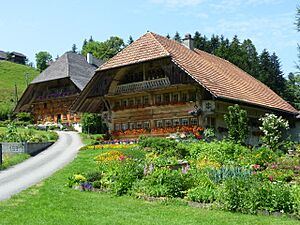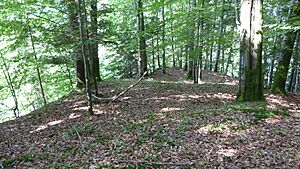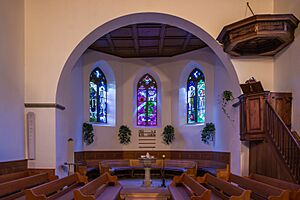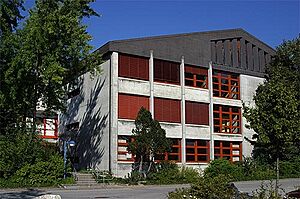Eggiwil facts for kids
Quick facts for kids
Eggiwil
|
||
|---|---|---|
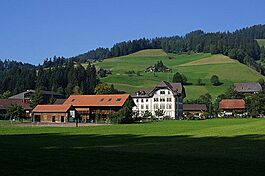
Eggiwil village
|
||
|
||
| Country | Switzerland | |
| Canton | Bern | |
| District | Emmental | |
| Area | ||
| • Total | 60.3 km2 (23.3 sq mi) | |
| Elevation | 736 m (2,415 ft) | |
| Population
(Dec 2020 )
|
||
| • Total | 2,486 | |
| • Density | 41.23/km2 (106.78/sq mi) | |
| Postal code |
3537
|
|
| Surrounded by | Langnau im Emmental, Marbach (LU), Röthenbach im Emmental, Schangnau, Signau, Trub, Trubschachen | |
Eggiwil is a small town, also called a municipality, located in the Emmental area of the canton of Bern in Switzerland. It's a peaceful place known for its beautiful natural surroundings.
Contents
History of Eggiwil
Eggiwil was first mentioned in old records in 1323. Back then, it was called Eggenwile.
The village likely started to be settled in the 1300s. Around this time, a family of knights called the Kyburg Ministerialis lived here. These knights worked for a powerful feudal lord. In 1372, the villagers bought their land from a nobleman named Freiherr von Schweinsberg. Later, they even bought the right to have their own local court. This meant they could make decisions about local matters, even though they were still part of the larger area of Signau.
In 1528, the city of Bern adopted a new Christian faith called the Protestant Reformation. This change spread to the areas around Bern, including Eggiwil. The next year, Bern took control of the entire Signau region. After the Reformation, some people called Anabaptists moved to Eggiwil. To encourage people to follow the new faith, Bern built a Swiss Reformed Church in the village between 1630 and 1632. In 1648, this church became the main church for the Eggiwil area.
The village is surrounded by many green alpine meadows. For a long time, the local economy depended on raising cattle in these meadows or cutting down trees from the nearby forests. However, cutting too many trees led to floods that damaged farms and homes. So, in the 1800s, people started planting new trees to protect the mountains.
Until 1830, the only way to reach Eggiwil was by a narrow mountain path. Then, a road was built to Schüpbach. Today, farming is still very important here. There are also some small workshops, mills, and sawmills that provide jobs. Eggiwil doesn't have easy road or train connections to big cities, so most people work within the municipality. Because the area is spread out, there are eight primary school buildings located in different parts of Eggiwil.
Geography of Eggiwil
Eggiwil covers an area of about 60.3 square kilometers (23.3 square miles). A large part of this land is used for farming (about 53.6%). Forests cover a big portion too (about 41.1%). The rest of the land is used for buildings, roads, rivers, or is unproductive.
About 1.8% of the land has houses and buildings, and 1.4% is for roads. A lot of the forest (38.5%) is dense, and some areas (2.6%) have orchards or small groups of trees. For farming, 4.2% is used for growing crops, 35.8% is for pastures where animals graze, and 13.0% is for alpine pastures high in the mountains. All the water in Eggiwil is from flowing rivers and streams.
The municipality has several small communities spread out. The main village of Eggiwil is located near the Emme River. Another village, Heidbühl, is where the Emme and Röthenbach rivers meet (this is called a confluence). Most of the smaller communities, known as hamlets (like Äschau, Neuenschwand, Horben, and Dieboldswil), are on a flat area called Eggen above the rivers.
In 2010, Eggiwil became part of a new administrative area called Verwaltungskreis Emmental.
Coat of Arms
The official symbol, or blazon, of Eggiwil's coat of arms shows a green fir tree on a red background. Above the tree, there are two golden stars.
People of Eggiwil (Demographics)
As of December 2012, Eggiwil had a population of 2,427 people. A small number of these (1.6%) were people from other countries. Between 2010 and 2012, the population slightly decreased. This was mostly because more people moved away than moved in, though more babies were born than people died.
Most people in Eggiwil (98.0%) speak German as their main language. A smaller number speak Albanian (0.6%) or English (0.2%).
In 2008, about 51.8% of the population were male and 48.2% were female. Most residents (about 58.5%) were born in Eggiwil and still lived there in 2000. Others were born in the same canton (30.1%), elsewhere in Switzerland (5.2%), or outside Switzerland (2.5%).
In 2012, young people (ages 0-19) made up 22.8% of the population. Adults (ages 20-64) were 59.7%, and seniors (over 64) were 17.6%.
In 2000, many people in Eggiwil were married (1,174 people). There were also many single people (1,150), and some who were widowed or divorced.
In 2010, there were 234 households with only one person and 123 households with five or more people. Most apartments (82.7%) were lived in all the time in 2000. In 2011, single-family homes made up 27.1% of all housing.
The chart below shows how Eggiwil's population has changed over time:

Important Heritage Sites
Two important historical places in Eggiwil are protected as heritage sites of national significance. These are the Farm House Inner-Zimmertsei and the Schweinsberg. The Schweinsberg is an earthwork, which is a large shape or mound made from earth, though its exact age is not known.
Economy of Eggiwil
In 2011, the unemployment rate in Eggiwil was very low, at 0.78%. This means almost everyone who wanted a job had one.
In 2011, 1,377 people worked in Eggiwil.
- The primary sector (like farming and forestry) employed 637 people in 204 businesses.
- The secondary sector (like manufacturing and construction) employed 358 people in 32 businesses.
- The tertiary sector (like services, shops, and education) employed 382 people in 84 businesses.
Most people (76.7%) who lived in Eggiwil also worked there in 2000. About 8.4% of workers used public transportation to get to work, and 52% used a private car.
In 2011, the average tax rate for a married resident with two children was 12.8%. For an unmarried resident, it was 18.8%.
Religion in Eggiwil
According to the 2000 census, most people in Eggiwil (88.3%) belonged to the Swiss Reformed Church. About 3.1% were Roman Catholic. There were also smaller numbers of people who belonged to other Christian churches, or were Muslim, Buddhist, or Hindu. Some people (1.72%) said they had no religion, and a few (3.44%) did not answer.
Education in Eggiwil
In Eggiwil, about 48.6% of adults have completed upper secondary education, which is like high school. About 10.6% have gone on to higher education, like university.
The school system in the Canton of Bern starts with one year of optional Kindergarten. Then, students attend six years of Primary school. After that, there are three years of mandatory lower Secondary school, where students are grouped by their abilities. After lower Secondary, students can continue their schooling or start an apprenticeship (learning a trade on the job).
During the 2011–12 school year, 247 students attended schools in Eggiwil. There were 2 kindergarten classes with 45 students. The municipality had 6 primary classes with 158 students. There were also 6 lower secondary classes with 35 students. Some students attended private or special schools.
In 2000, 316 students lived and went to school in Eggiwil. Another 48 students came from other towns to study here. At the same time, 99 residents of Eggiwil went to schools outside the municipality.
Eggiwil has a library called Jugend- und Volksbibliothek Eggiwil. In 2008, the library had 6,502 books and other media. It loaned out 29,721 items that year. The library was open 161 days a year, for about 5 hours per week.
See also
 In Spanish: Eggiwil para niños
In Spanish: Eggiwil para niños
 | Aaron Henry |
 | T. R. M. Howard |
 | Jesse Jackson |





